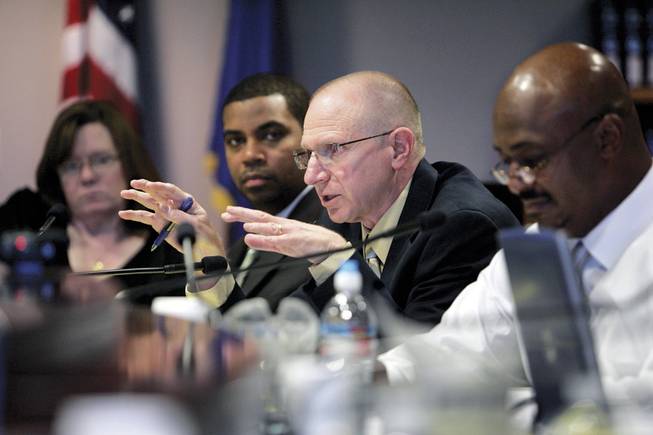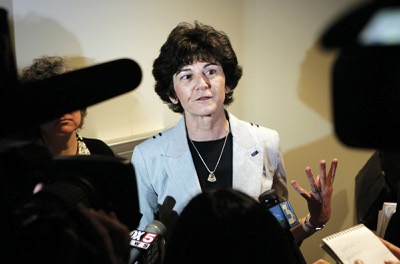
State Sen. Joe Hardy, center, joined by other senators, asks a question Thursday during a hearing at the Sawyer State Building on the health scare caused by the Endoscopy Center of Southern Nevada.
Saturday, March 8, 2008 | 2 a.m.
Sun Topics
Sun Archives
- State failed to inspect clinic for seven years (3-6-2008)
- Letter: Education system contributes to health scare (3-5-2008)
- Rally cry: Investigate accused doctors (10-2-2007)
Beyond the Sun

Lisa Jones, chief of the state Licensure and Certification Bureau, speaks to reporters after testifying Thursday on the health scare. She says the Endoscopy Center of Southern Nevada had not undergone a full inspection by the state because of a lack of resources. Last year, a proposal would have cut 10 inspectors from the state budget but was defeated.
With patients in unprecedented numbers endangered by a Las Vegas endoscopy clinic, the state’s appetite and resources for regulating and enforcing laws governing medical practices are facing new scrutiny.
And as the crisis grows, teams of federal health investigators are swooping into Nevada. Their mission: to help inspect all 50 ambulatory surgical centers in the next 30 days and share their findings across the country.
They hope to learn how to avoid what Nevadans are still trying to grasp: nurses in one of the busiest clinics in the state knowingly neglecting the most basic disease prevention methods when they injected patients, apparently at the direction of physicians. That led to six acute hepatitis C cases and 40,000 people being told to be tested for hepatitis B, hepatitis C and HIV.
State officials have since acknowledged that the clinic, now closed by order of Las Vegas City Hall, hadn’t been fully inspected in seven years, even though inspections are supposed to occur every three years.
The shortcuts that caused the hepatitis C outbreak triggered clinic inspections statewide that found more flawed practices endangering patients.
Federal officials want to examine this unprecedented health care breakdown in Nevada to study how to better regulate such facilities nationwide.
Teams from the Centers for Disease Control and Prevention in Atlanta and the Centers for Medicare and Medicaid Services in Washington, D.C., are scheduled to arrive within days.
Never before have all ambulatory surgical centers in a state been investigated in the same year, according to a senior official with the Medicare and Medicaid office.
“We’ll come up not only with a Nevada strategy, but a national strategy to address issues of unsafe medical practices,” said the official, who was not authorized to speak for attribution.
He said ambulatory surgical centers — clinics that provide outpatient surgery — are the fastest-growing type of Medicare providers.
The federal government contracts with states to inspect facilities. A heated debate about the state’s effectiveness in regulating the clinics is taking place in Nevada after the Endoscopy Center debacle. The arguments center on two subjects: inspections and enforcement.
The Endoscopy Center had not undergone a full inspection by the state because of a lack of resources, said Lisa Jones, chief of the state’s Licensure and Certification Bureau.
Federal law mandates nursing home inspections annually and home health care inspections every three years. States also must respond to complaints. That leaves little time for the 25 Nevada inspectors to conduct unannounced inspections of the 1,100 facilities across the state, including 50 ambulatory surgical centers such as the Endoscopy Center of Southern Nevada.
A lack of funding is part of the problem. Last year, Gov. Jim Gibbons proposed cutting 10 additional inspectors from a proposed budget because paying for them would have required a fee increase.
Legislators pushed back, though, and funded six new positions, according to Assemblywoman Sheila Leslie, D-Reno, who was active in the fight.
Now the governor would consider new fees, his chief of staff said.
“Fees have to be looked at regularly to determine whether they are paying for services necessary,” said Mike Dayton.
Then there’s the question of how the state handles violations when inspections turn up something wrong.
At the Endoscopy Center of Southern Nevada, nurses violated basic principles of disease prevention, authorities found. They were reusing syringes for individual patients, which can taint medicine vials, and then reusing the vials — intended only for single-use — on multiple patients, which passed along infection.
When the state discovered the violations, the Health Division did what it has always done — it allowed the clinic to correct the violations while remaining open.
The state has not closed an ambulatory surgical center in at least 11 years, nor do officials say they intend to.
Linda Anderson, the chief deputy attorney general who represents the Health Division, is the one who makes decisions about such matters. She said the state’s mission is to keep clinics open and practicing safely.
“We license facilities, we don’t punish wrongdoers,” Anderson said.
Punitive measures are for criminal authorities, civil lawsuits and licensing boards, she said. The Nevada State Nursing Board and the Nevada State Medical Examiners Board are more tailored to investigating individuals, Anderson said. She has to think about the entire health system — and “the public health really demands that we have access to these facilities.”
Assembly Speaker Barbara Buckley, D-Las Vegas, takes issue with Anderson’s interpretation of state law. She said Friday the clinic that started the outbreak, the Endoscopy Center of Southern Nevada, should have been shut down for its dangerous injection practices.
“If not now, when?” she said. “You don’t get to say you’re sorry when you knowingly put lives at risk. This wasn’t a simple mistake an aide made. It appears to be a pattern and practice.”
Buckley, a lawyer, said she believes the state law is sufficient for state investigators to have shut it down.
Among the reasons a license can be revoked, according to state law, is conduct harmful to “the public health, morals, welfare and safety of the people of the state of Nevada.”
“The questions are, how is the law enforced, is it enforced, how should it be enforced?” she said. The response, Buckley said, was not proper in this situation.
Anderson is certain of her position, but Buckley thinks she should change it.
Then there’s the question of fines.
The state, interpreting the law conservatively, allowed the Endoscopy Center to correct the actions and stay open, and issued only a $3,000 fine, the maximum $1,000 penalty for three violations.
Buckley said state law allows a fine of $1,000 per day, per infraction, and that maximum penalty should have been applied. Going back to March 2004, the supposed origin of the unsafe practices, the fine would have been more than $4 million.
When asked about the state not shutting down the Endoscopy Center, Dayton, the governor’s chief of staff, said: “We found that shocking.”
He said Gibbons will be working with the Legislature to review whether the laws are adequate to shut down these facilities.
He said there is a balance between regulation and allowing businesses to operate.
“We don’t want businesses overregulated. At the same time, we have to make sure the public welfare, public safety, is always protected,” he said. “The state needs to take steps to make sure this tragedy doesn’t happen again.”

Join the Discussion:
Check this out for a full explanation of our conversion to the LiveFyre commenting system and instructions on how to sign up for an account.
Full comments policy